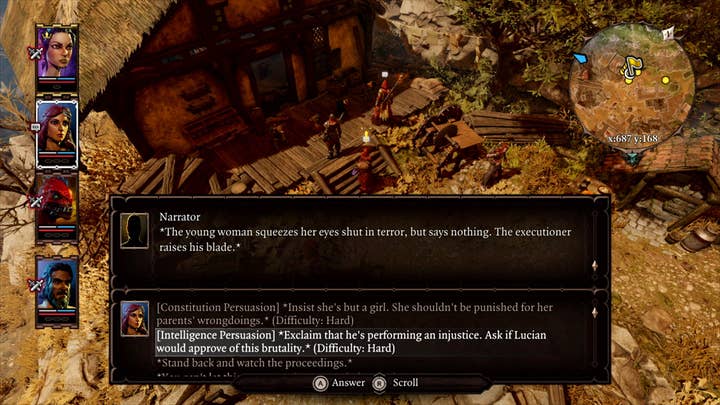Games of the Year 2019: Divinity: Original Sin II
The Switch version of Larian's latest captures the feel of pen-and-paper role-playing in ones and zeroes
I'm a bit of a Dungeons & Dragons dilletante. I've never been big into pen-and-paper role-playing games, but there were some stretches where I would tag along with friends to play in their weekly game night for a month or two.
During those sessions, I was fortunate enough to have played with a guy named Don who opened my eyes to what a great dungeon master could be. He had an encyclopedic knowledge of sci-fi and fantasy stories that he remixed into diligently prepared adventures. I quickly learned that his games would always have a compelling premise and a cathartic payoff, if you were good enough to make it that far.
The parties I was in usually weren't that good, in large part because they were always having to carry an unimaginative novice like me. Fortunately, after the party was dead and we turned in our character sheets, Don was usually kind/cruel enough to give us a piece or two of the larger puzzle, like who was controlling that clockwork army or why an entire village entered a trance-like state at the same time every week. Not enough to spell everything out (or spoil some undiscovered twists he might want to re-use in a later session), but enough to tease us with what might have been.

In the first of my failed expeditions with Don, I rolled up a dwarf character. After some token Tolkien-esque exposition, we wound up exploring an intricate system of caves and came across a locked chest. There was no key around and we didn't have a thief in the party, so I blurted out that I would open the thing with my axe. Before my fellow players could collectively finish their cries of "Nooooooooooooooo," Don chuckled with a gleeful "OK!" and rolled the dice.
I did indeed open the chest, but I had also cleaved its contents -- a magical tome of great narrative importance -- as well. The destruction of the powerful artifact produced an explosion of some sort lightly damaging me and my party, but the burn damage I felt for doing something stupid and being surprised by the outcome was considerably more than 1d4.
Later that night, after the traditional case of disgusting Jack in the Box tacos was consumed and the entire party had met our untimely demise, Don offered some consolation, saying that my brute force problem-solving was actually quite appropriate for role-playing a dwarf.
That didn't make me feel any better, but I still left the table exhilarated by the experience. The video games I was used to playing were largely idiot-proofed. Sure, you could die or fail to meet a skill threshold, but you generally couldn't influence the world in a way that would haunt you down the road. (Unless it was a Sierra adventure game where it was spitefully and arbitrarily designed to stymie anyone who didn't buy a hint book.)
Playing Dungeons & Dragons with Don was like having the guard rails taken away and being given a world that I could truly influence and interact with however I saw fit. And if I did something dumb, or antagonized everyone in my path, or sabotaged the carefully planned storyline, Don would roll with it. The world would react as one might expect, and we would have to deal with the consequences. Sometimes that meant improvised adventures that were every bit the equal of his meticulously prepared campaigns. Sometimes that meant being cursed by a witch to spend your life with a bucket stuck on your head.

That's what playing Divinity: Original Sin II has felt like to me. I don't think any game yet made could be as open-ended and adaptable and brilliant as the best pen-and-paper dungeon master, but Original Sin II consistently has me thinking about the longer-term and bigger picture consequences of my actions. It has me behaving as if the game has a Virtual Don, forever ready to give a gleeful chuckle and roll the dice to bring my latest Bad Idea into reality. And that's something I've never had in a video game before.
I've put more than 80 hours into Original Sin II since it came out on the Switch this year and I haven't even completed my first playthrough yet. I say "first playthrough" because there's obviously so much to this world I haven't seen, so many stories that could play out differently, so many different approaches I could take to combat and puzzle-solving, that it somehow makes the idea of replaying an 80-hour RPG understandable to the point of actually enticing.
Just like Don, Original Sin II packs its world full of intricately crafted yet fragile stories, and refuses to protect them from your actions. The game isn't unfair, and there are plenty of options to make things easier like a variety of difficulty levels and the ability to re-spec your character, but the world itself reacts to the player in the expected way. While the game's narrative casts the player as an avatar of the gods, many of its stories and its systems treat you the way they would any random fool. And that's a refreshing change of pace from an industry that so commonly baby-proofs every user interaction possible.
One last note on this. One of the game's writers, Kevin VanOrd, is a former co-worker of mine from GameSpot. I point this out partly in the interest of disclosure, and partly because I am proud a friend of mine contributed to such a brilliant game.
